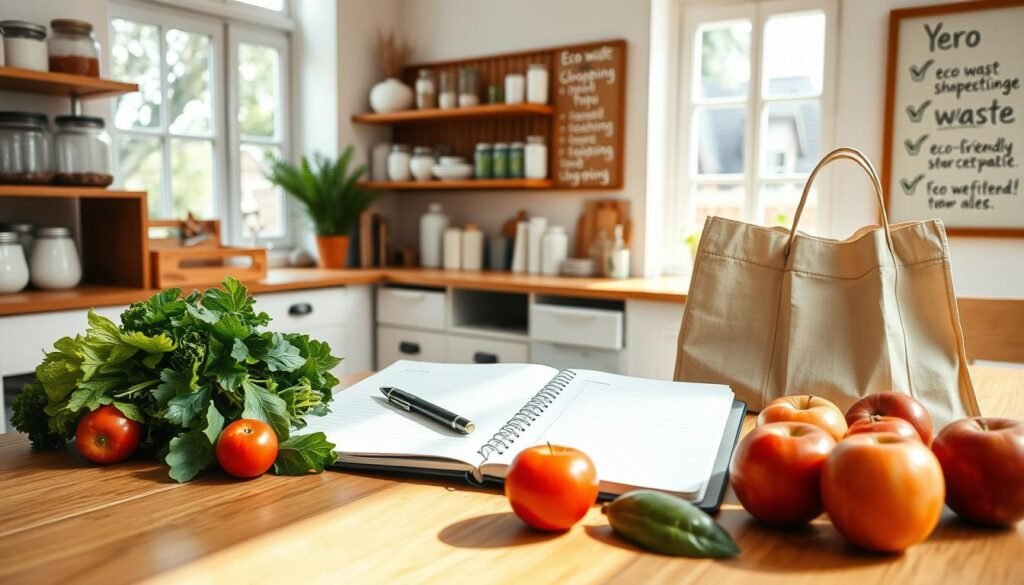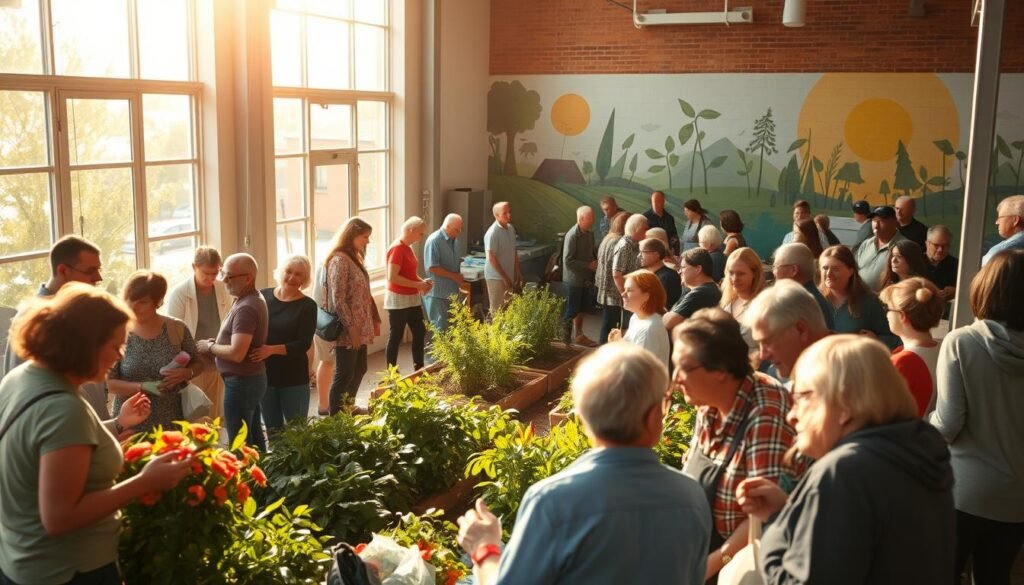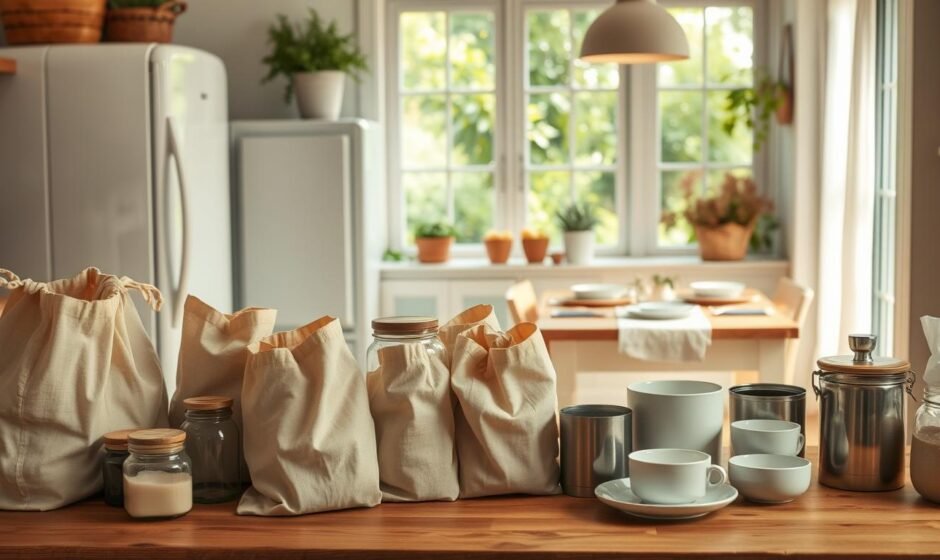Did you know that about 80% of waste in the U.S. ends up in landfills? This fact shows how important it is to reduce waste. Starting a zero-waste lifestyle helps cut down on waste and supports a sustainable future.
By choosing to live zero-waste, you can make a big difference. It’s not just about the environment; it also helps reduce greenhouse gas emissions by up to 50%. Every step you take towards zero-waste living is a step towards a better future.
It’s okay if you can’t achieve ‘zero’ waste right away. But aiming for minimal waste is a great goal for you and the planet. Every small change you make can have a big impact.
Key Takeaways
- Starting a zero-waste lifestyle can significantly reduce your environmental impact.
- Every small change contributes to a cleaner planet and promotes sustainability.
- Emphasising reused and recycled materials can lead to substantial economic savings.
- Mindful consumption not only minimises waste but also reduces water usage.
- Joining a supportive community can enhance your journey towards zero waste.
- Striving for minimal waste is a practical goal for sustainable living.
Understanding the Zero-Waste Concept
The zero-waste concept is a big change in how we think about waste and using things. It’s about making less waste by using things that can be reused or recycled. It’s important for anyone who wants to help the environment and their community.
What is Zero-Waste Living?
Zero-waste living is choosing to make less waste in our daily lives. The UK aims to cut waste by 2050, and we can help. By making smart choices when we buy and use things, we can make a big difference.
There’s a simple guide called the Zero Waste hierarchy. It has five steps: Refuse, Reduce, Reuse, Recycle, and Rot. It helps us live more eco-friendly.
The Importance of Reducing Waste
Reducing waste is key for our planet and fighting climate change. The average person throws away a lot of waste every day. Sadly, only a small part of plastic waste is recycled.
Changing how we live is urgent. Simple actions like composting can cut down food waste by a lot. This helps reduce landfill waste and cuts down on harmful gases.
Looking into ways to live more sustainably? Check out Low Waste Kitchen: Radical Recipes for Sustainable. It offers tips on cooking and reducing waste. By tracking your waste, you can find ways to improve. This journey can help our planet and community.
Reasons to Embrace a Zero-Waste Lifestyle
Choosing a zero-waste lifestyle has many benefits for you and the planet. It’s about making smart choices that help the environment, improve your health, and save money.
Environmental Benefits
Living zero-waste helps protect our natural world. Every year, 1.3 billion tons of food are wasted globally. This movement aims to cut down on such waste.
Food production uses a lot of land and water. By adopting zero-waste, you help reduce methane emissions. Methane is much worse for the environment than CO2.
Health Advantages
Living zero-waste means less exposure to harmful toxins. You choose reusable items over disposable ones. This reduces plastic in your home.
Almost 40% of food in the U.S. is thrown away. Sustainable living leads to healthier choices and safer homes for your family.
Economic Savings
There are big savings in a zero-waste lifestyle. U.S. families waste about $640 a year on food they could reuse. This mindset leads to long-term savings.
Creating less waste means spending less on things that get thrown away. It helps you budget better.
Simple Swaps for Everyday Items
Starting a zero-waste lifestyle is easy with small changes. By making eco-friendly swaps, you can cut down on waste and live more sustainably. These changes help beginners adopt a greener lifestyle.
Reusable Bags and Containers
Choosing reusable bags and containers cuts down on single-use plastics. A cotton tote bag can replace 600 plastic bags. Reusable containers for shopping and food save over £100 a year.
A good reusable water bottle stops 167 plastic bottles from being thrown away each year. This helps our planet stay healthy.
Alternatives to Single-Use Products
Switching to reusable items reduces waste a lot. Using cloth napkins saves about 50 pounds of paper waste yearly. Menstrual cups can replace 2,500 disposable products.
Reusable coffee cups prevent 1 billion disposable cups from landfill each year. This is a big step towards a cleaner environment.
Homemade Cleaning Solutions
Homemade cleaning solutions are better than chemical products. Vinegar and baking soda clean surfaces well and are safe. They save about £50 a year and reduce plastic waste from store-bought cleaners.
Smart Shopping Practices
Adopting smart shopping habits is key to a zero-waste lifestyle. Planning your grocery list helps avoid impulse buys. It also ensures you make eco-friendly choices. This approach reduces food waste at home.
Planning Your Groceries
Shopping with a meal plan in mind makes waste reduction easier. Make a list for the week’s meals. This way, you buy only what you need, cutting down on waste.
Keep track of staples and seasonal produce. This keeps your meals fresh and varied.
Choosing Bulk and Package-Free Options
Bulk shopping is great for cutting down on packaging waste. Visit local markets for package-free items. Using your own containers reduces single-use plastics.
These habits are good for your health and the planet. They help lower landfill waste significantly.

Reducing Food Waste at Home
Reducing food waste is key to a zero-waste lifestyle. Composting and meal planning are effective ways to do this. Composting turns organic waste into fertiliser, while meal planning helps use up perishables before they go bad. Together, they can greatly reduce your household’s waste.
Composting Basics
Composting cuts down on landfill waste and improves your garden soil. Learn what can be composted, like fruit and vegetable scraps, coffee grounds, and yard waste. Avoid meats and dairy to prevent pests.
Regularly turn your compost pile and mix green and brown materials. This speeds up decomposition and keeps smells away.
Meal Planning Tips
Good meal planning can cut down on food waste. Check what you have before shopping. This stops you from buying too much and helps use up what’s near expiry.
Use “ugly” produce for meals. It’s often thrown away but is fine to eat. Plan meals that use leftovers to reduce waste. Studies show meal planning can cut waste by up to 50%.
Eco-Friendly Personal Care
The personal care industry offers many chances to live a zero-waste life. Choosing eco-friendly products can greatly cut down plastic waste. It also helps the environment. By picking sustainable options, you’re not just saving the planet. You’re also looking after your health and well-being.
Switching to Zero-Waste Toiletries
Switching to zero-waste toiletries is easy and makes a big difference. Try using bamboo toothbrushes instead of plastic ones. They’re good for the planet and work well.
Choose soaps and shampoos without packaging. This cuts down on plastic waste. Making these changes helps the environment and supports sustainable living.
Sustainable Beauty Products
The need for green beauty products is growing. Companies are now using natural ingredients and eco-friendly packaging. Look for cosmetics in refillable containers or made from recycled materials.
These choices are better for the planet and your skin. For more tips on living sustainably, check out practical advice and community support.
Creative Recycling Ideas
Embracing creative recycling helps the environment and lets you make new things from old ones. It’s all about upcycling ideas that turn waste into something useful. This way, you help reduce waste and support a green future.
Upcycling Household Items
Many of us have items that are no longer needed. Creative recycling is about finding new uses for these things. Here are some cool upcycling ideas:
- Turn glass jars into cool storage for food or craft supplies.
- Give old furniture a new life, like turning a ladder into a bookshelf.
- Make tote bags or quilts from old clothes.
These ideas not only make your home look better but also help the planet. Every small step towards creative recycling makes a big difference.
Donating Unused Goods
Instead of throwing away things that are okay, donate them to charities. This helps those in need and keeps useful items from ending up in landfills. By donating unused items, you help your community and encourage others to be green too.
When you declutter, think about the good you can do. Donating can inspire others to do the same. It builds a community that cares about the planet and wants to reduce waste.
| Item Type | Upcycling Idea | Benefits |
|---|---|---|
| Glass Jars | Storage containers for crafts | Declutters space, reduces waste |
| Old Furniture | Bookshelf from a ladder | Creates new decor, saves money |
| Worn Clothing | Tote bags or quilts | Reduces textile waste, personalisation |
Building a Supportive Community
Joining a zero-waste community can really help you live more sustainably. You’ll find motivation and support from people who also want to reduce waste. This community is a place where you can share tips, learn from each other, and work together on green projects.
Joining Local Zero-Waste Groups
Being part of local groups focused on zero-waste is great. You meet people who love sustainability. They often have events, workshops, and clean-up days to help you live greener.
By joining these groups, you can make a bigger impact. You’ll also help others in your area start living more sustainably. Studies show that being part of these groups can make you more committed to eco-friendly living by up to 60%.
Online Resources and Forums
Online resources and forums are also key in your zero-waste journey. They offer lots of information, tutorials, and discussions on sustainable living. You can find new ways to reduce waste and meet others who share your goals.
For example, check out this resource for useful tips. Being part of these online discussions can broaden your knowledge and motivate you to live more sustainably every day.

Challenges on Your Zero-Waste Journey
Starting a zero-waste journey is both rewarding and tough. It’s hard to get rid of all waste, as a fully zero-waste life seems impossible. Big hurdles include products wrapped in non-recyclable materials, which can stop your progress.
Switching to sustainable items costs more at first. This might make you think twice about using metal straws or cloth napkins.
Common Obstacles to Overcome
Meal planning is key to beating zero-waste challenges. Organising well and managing your time helps cut down on food waste. DIY projects can replace convenience items, but they need a lot of effort to start.
Also, labels like “recyclable” or “compostable” can be tricky. Many “recyclable” plastics are hard to recycle locally. Compostable plastics need special conditions, which are rare at home.
Staying Motivated
Keeping up the motivation in your zero-waste journey can be tough. Transitions can feel emotionally draining. You might feel frustrated or guilty.
Support from your community can help a lot. It can boost your spirits and help you push through hard times. Start with simple changes. These small wins can build momentum for bigger lifestyle changes.
Your Path to Sustainable Success
Starting your journey to a zero-waste lifestyle means setting realistic goals. Begin with small, achievable targets like using reusable bags or buying in bulk. These steps are easier to follow and build a strong base for your eco-friendly journey.
Setting Realistic Goals
Tracking your progress is key to staying committed to sustainable living. Celebrate your small wins to keep yourself motivated. Every little change helps, making a big difference in reducing waste.
Tracking Your Progress
Use tools like journals or apps to track your waste reduction. Joining social media groups focused on zero-waste living can offer support and ideas. This way, you can see the impact of your actions and keep improving your sustainable success.




